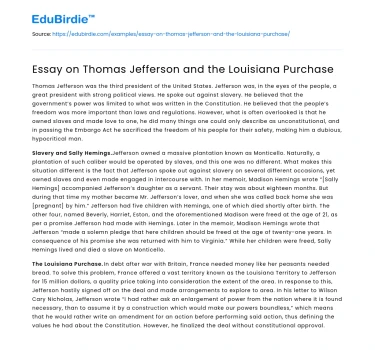Thomas Jefferson was the third president of the United States. Jefferson was, in the eyes of the people, a great president with strong political views. He spoke out against slavery. He believed that the government’s power was limited to what was written in the Constitution. He believed that the people’s freedom was more important than laws and regulations. However, what is often overlooked is that he owned slaves and made love to one, he did many things one could only describe as unconstitutional, and in passing the Embargo Act he sacrificed the freedom of his people for their safety, making him a dubious, hypocritical man.
Slavery and Sally Hemings. Jefferson owned a massive plantation known as Monticello. Naturally, a plantation of such caliber would be operated by slaves, and this one was no different. What makes this situation different is the fact that Jefferson spoke out against slavery on several different occasions, yet owned slaves and even made engaged in intercourse with. In her memoir, Madison Hemings wrote “[Sally Hemings] accompanied Jefferson’s daughter as a servant. Their stay was about eighteen months. But during that time my mother became Mr. Jefferson’s lover, and when she was called back home she was [pregnant] by him.” Jefferson had five children with Hemings, one of which died shortly after birth. The other four, named Beverly, Harriet, Eston, and the aforementioned Madison were freed at the age of 21, as per a promise Jefferson had made with Hemings. Later in the memoir, Madison Hemings wrote that Jefferson “made a solemn pledge that here children should be freed at the age of twenty-one years. In consequence of his promise she was returned with him to Virginia.” While her children were freed, Sally Hemings lived and died a slave on Monticello.
Save your time!
We can take care of your essay
- Proper editing and formatting
- Free revision, title page, and bibliography
- Flexible prices and money-back guarantee
The Louisiana Purchase. In debt after war with Britain, France needed money like her peasants needed bread. To solve this problem, France offered a vast territory known as the Louisiana Territory to Jefferson for 15 million dollars, a quality price taking into consideration the extent of the area. In response to this, Jefferson hastily signed off on the deal and made arrangements to explore to area. In his letter to Wilson Cary Nicholas, Jefferson wrote “I had rather ask an enlargement of power from the nation where it is found necessary, than to assume it by a construction which would make our powers boundless,” which means that he would rather write an amendment for an action before performing said action, thus defining the values he had about the Constitution. However, he finalized the deal without constitutional approval. In doing this, he violated his principles, which adds to his hypocrisy.






 Stuck on your essay?
Stuck on your essay?

